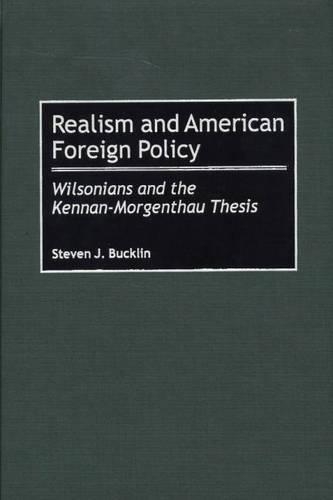
Realism and American Foreign Policy: Wilsonians and the Kennan-Morgenthau Thesis
(Hardback)
Publishing Details
Realism and American Foreign Policy: Wilsonians and the Kennan-Morgenthau Thesis
By (Author) Steven J. Bucklin
Bloomsbury Publishing PLC
Praeger Publishers Inc
30th November 2000
United States
Classifications
Tertiary Education
Non Fiction
International relations
327.73
Physical Properties
Hardback
192
Description
George Kennan and Hans Morgenthau argued that moralistic and legalistic beliefs bound Wilsonian internationalists to policies outside the national interest. Establishing their claims in the decade following World War II, Kennan and Morgenthau contended that the United States had over-extended its commitments, an interpretation that came to dominate opponents' criticisms of Wilson and his followers. Bucklin shows, after careful examination of the evidence, that the policies that Wilsonians advocated from 1919 to 1954 were generally in concert with those of the realists. Wilsonians understood balance of power politics, sought the professionalization of the Foreign Service, advocated diplomacy, and demonstrated an acute understanding of the long-term national interest. After establishing the basis of the Kennan/Morgenthau thesis, Bucklin provides a comparative analysis between the policies of Wilson and his disciples and those of Kennan and Morgenthau. This study is based upon an examination of the papers and voluminous publications of three prominent Wilsonians: Quincy Wright, Frederick Schuman, and Denna Fleming, as well as the writings of Kennan and Morgenthau. Beginning with a detailed study of Woodrow Wilson's foreign policy, Bucklin presents the case that Wilson's policies were designed to meet the national interest. The test continues with a consideration of American policies in the inter-war years, World War II, and the first decade of the Cold War to include collective security, neutrality, appeasement, and containment. Efforts to label the Wilsonians as idealistic fail when put to the test of the realists.
Reviews
.,."offers an excellent introduction to the writings and careers of Wright, Fleming, and Schuman."-The International History Review
...offers an excellent introduction to the writings and careers of Wright, Fleming, and Schuman.-The International History Review
Realism and American Foreign Policy is a valuable contribution to students of international relations. Although this brief, well-written book assumes a basic knowledge of twentieth-century American foreign policy and is primarily directed toward specialists, a general reader may gain a better appreciation of twentieth-century foreign policy issues. Moreover, readers should take from this book a heightened sense of the need for foreign policy initiatives that will contribute to a constructive world order in the twenty-first century.-South Dakota History
..."offers an excellent introduction to the writings and careers of Wright, Fleming, and Schuman."-The International History Review
"Realism and American Foreign Policy is a valuable contribution to students of international relations. Although this brief, well-written book assumes a basic knowledge of twentieth-century American foreign policy and is primarily directed toward specialists, a general reader may gain a better appreciation of twentieth-century foreign policy issues. Moreover, readers should take from this book a heightened sense of the need for foreign policy initiatives that will contribute to a constructive world order in the twenty-first century."-South Dakota History
Author Bio
STEVEN J. BUCKLIN is Professor of Modern American History at the University of South Dakota./e
